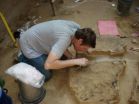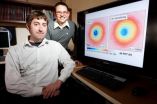(Press-News.org) WASHINGTON — To help alleviate the effects of severe traumatic brain injury (TBI), the U.S. Department of Defense should ensure that all military personnel with this type of injury receive adequate protein and calories immediately after the trauma and through the first two weeks of treatment, says a new report from the Institute of Medicine. Evidence from several studies of severely brain-injured patients shows that providing energy and protein to patients early reduces inflammation and improves their outcomes, said the committee of experts who wrote the report.
This is the only nutrition-related approach to treating TBI that the committee recommended DOD implement at this time based on its review of the possible benefits of nutrients, dietary supplements, and specific diets to improve outcomes for TBI ranging from mild to severe. Several other nutritional approaches show potential for reducing the symptoms of brain injury, but there is not yet enough evidence about their effectiveness to recommend their adoption.
The committee identified the B vitamin choline, the amino acid-like compound creatine, n-3 fatty acids commonly known as EPA and DHA, and zinc as the most promising areas of investigation and recommended that DOD scientists and other researchers give them priority attention. These approaches are ones for which human clinical trials have been undertaken or are ongoing.
Other approaches, including antioxidants, flavonoids, ketogenic diets, and vitamin D, have less supporting evidence that has come solely from animal studies or from studies in people with different conditions. Although researchers must prioritize resources, DOD should continue to monitor the clinical literature for any new findings about the potential of these nutrients and diets in lessening brain injury effects, the report says.
The research priorities outlined in the report could generate information that provides health professionals with a fuller picture of which nutrients and dietary approaches work safely and most effectively. This information could also lead to new evidence-based clinical guidelines. There are few well-supported guidelines to inform health professionals' use of foods and dietary supplements to treat brain-injured patients, so clinicians employ a wide range of practices.
The IOM study focused on the potential role of nutrition in protecting against or treating the immediate and near-term effects of TBI. It did not evaluate the role of nutritional therapies in the rehabilitation phase or address long-term health effects associated with brain trauma, such as post-traumatic stress disorder, Alzheimer's disease, pain, and depression. A review of nutrition approaches to lessen long-term effects of TBI would be useful, the committee noted.
TBI is a significant cause of death and disability among personnel serving in the wars in Iraq and Afghanistan. It also contributes to nearly one-third of all injury-related deaths in the United States, making it a major health concern for the civilian population as well. According to recent estimates, between 1.6 million and 3.8 million sports-related TBIs occur annually, including those not treated by a health care provider.
###
The study was sponsored by the U.S. Army Medical Research and Materiel Command of the U.S. Department of Defense. Established in 1970 under the charter of the National Academy of Sciences, the Institute of Medicine provides independent, objective, evidence-based advice to policymakers, health professionals, the private sector, and the public. The National Academy of Sciences, National Academy of Engineering, Institute of Medicine, and National Research Council make up the National Academies. For more information, visit http://national-academies.org or http://iom.edu. A committee roster follows.
Contacts:
Christine Stencel, Senior Media Relations Officer
Shaquanna Shields, Media Relations Assistant
Office of News and Public Information
202-334-2138; e-mail news@nas.edu
Pre-publication copies of Nutrition and Traumatic Brain Injury: Improving Acute and Subacute Health Outcomes in Military Personnel are available from the National Academies Press; tel. 202-334-3313 or 1-800-624-6242 or on the Internet at http://www.nap.edu. Reporters may obtain a copy from the Office of News and Public Information (contacts listed above).
INSTITUTE OF MEDICINE
Food and Nutrition Board
Committee on Nutrition, Trauma, and the Brain
John W. Erdman Jr., M.S., Ph.D. (chair)
Professor Emeritus
Department of Food Science and Human Nutrition
University of Illinois
Urbana-Champaign
Eldon Wayne Askew, Ph.D.
Professor and Director
Division of Nutrition
University of Utah
Salt Lake City
Bruce R. Bistrian, M.D., Ph.D.
Professor of Medicine
Harvard Medical School, and
Chief
Clinical Nutrition
Beth Israel Deaconess Medical Center
Boston
Joseph G. Cannon, Ph.D.
Professor
College of Allied Health Services
Georgia Health Sciences University
Augusta
Xiang Gao, M.D., Ph.D.
Research Scientist
Department of Nutrition
Harvard School of Public Health, and
Assistant Professor
Harvard Medical School
Boston
Michael S. Jaffee, M.D.
Fellow
San Antonio Uniformed Services Health Education Consortium
Lackland Air Force Base
San Antonio
Robin B. Kanarek, Ph.D.
John Wade Professor of Psychology
Tufts University
Medford, Mass.
Cathy W. Levenson, Ph.D.
Associate Professor of Biomedical Science and Neuroscience, and
Hazel K. Stiebeling Associate Professor
Department of Nutrition, Food, and Exercise Sciences
Florida State University
Tallahassee
Esther F. Myers, Ph.D., R.D.
Chief Science Officer
Research and Strategic Business Development
American Dietetic Association
Chicago
Linda J. Noble, Ph.D.
Professor of Neurological Surgery and Physical Therapy and Rehabilitation Science,
and
Co-Director and Principal Investigator
Brain and Spinal Injury Center
University of California
San Francisco
Ross D. Zafonte, D.O.
Professor and Chair
Department of Physical Medicine and Rehabilitation
Harvard Medical School, and
Vice President of Medical Affairs
Spaulding Rehabilitation Hospital
Boston
STAFF
Maria Oria, Ph.D.
Study Director
END
Queen's University professor Kate Harkness has found that a history of physical, sexual or emotional abuse in childhood substantially increases the risk of depression in adolescence by altering a person's neuroendocrine response to stress.
Adolescents with a history of maltreatment and a mild level of depression were found to release much more of the stress hormone cortisol than is normal in response to psychological stressors such as giving a speech or solving a difficult arithmetic test.
"This kind of reaction is a problem because cortisol kills cells in areas of ...
BUFFALO, NY -- Exposure to air pollution early in life and when a woman gives birth to her first child may alter her DNA and may be associated with premenopausal breast cancer later in life, researchers at the University at Buffalo have shown.
The findings indicated that higher air pollution exposure at birth may alter DNA methylation, which may increase levels of E-cadherin, a protein important to the adhesion of cells, a function that plays an essential role in maintaining a stable cellular environment and assuring healthy tissues.
Methylation is a chemical process ...
Scientists seeking to understand the origin of the human mind may want to look to honeybees -- not ancestral apes -- for at least some of the answers, according to a University of Colorado Boulder archaeologist.
CU-Boulder Research Associate John Hoffecker said there is abundant fossil and archaeological evidence for the evolution of the human mind, including its unique power to create a potentially infinite variety of thoughts expressed in the form of sentences, art and technologies. He attributes the evolving power of the mind to the formation of what he calls the ...
Researchers at Rice University and Texas A&M have discovered a way to pattern active proteins into bio-friendly fibers. The "eureka" moment came about because somebody forgot to clean up the lab one night.
The new work from the Rice lab of biochemist Kathleen Matthews, in collaboration with former Rice faculty fellow and current Texas A&M assistant professor Sarah Bondos, simplifies the process of making materials with fully functional proteins. Such materials could find extensive use as chemical catalysts and biosensors and in tissue engineering, for starters.
Their ...
Despite economic anxiety and concern for the future of the country, most Houstonians perceive an improving quality of life locally and 90 percent believe that Houston is a better place to live than most other metropolitan areas, according to the 30th annual Kinder Houston Area Survey conducted by Rice University. The findings were released today during a luncheon hosted by the Greater Houston Partnership and Rice's Kinder Institute for Urban Research.
The survey showed that Harris County residents have become a little more upbeat in their personal economic outlooks ...
(Baltimore, MD) – Today, the Interactive Autism Network (IAN), www.ianproject.org, the nation's largest online autism research project, reveals the preliminary results of the first major survey on wandering and elopement among individuals with autism spectrum disorders (ASD), and announces the launch of a new research survey on the association between pregnancy factors and ASD. The wandering and elopement survey found that approximately half of parents of children with autism report that their child elopes, with the behavior peaking at age four. Among these families, nearly ...
As partners in the international research consortium named MetaHit, scientists from the University of Copenhagen have contributed to show that an individual's intestinal bacteria flora, regardless of nationality, gender and age, organises itself in certain clusters. The cluster of intestinal bacteria flora is hypothesised to have an influence on how we react to both our diet and medicine absorbed through the gastro-intestinal tract. The results have recently been published in the journal Nature.
Most people know about blood types, some also know about tissue types. However, ...
BUFFALO, N.Y. -- Did the early universe have just one spatial dimension?
That's the mind-boggling concept at the heart of a theory that University at Buffalo physicist Dejan Stojkovic and colleagues proposed in 2010.
They suggested that the early universe -- which exploded from a single point and was very, very small at first -- was one-dimensional (like a straight line) before expanding to include two dimensions (like a plane) and then three (like the world in which we live today).
The theory, if valid, would address important problems in particle physics.
Now, in ...
CHAMPAIGN, Ill. — Coastal residents and oil-rig workers may soon have longer warning when a storm headed in their direction is becoming a hurricane, thanks to a University of Illinois study demonstrating how to use existing satellites to monitor tropical storm dynamics and predict sudden surges in strength.
"It's a really critical piece of information that's really going to help society in coastal areas, not only in the U.S., but also globally," said atmospheric sciences professor Stephen Nesbitt. Nesbitt and graduate student Daniel Harnos published their findings in ...
People in the Louisville area can now have gorgeous smiles for less. Ideal Dentistry in Prospect, Kentucky recently began offering a unique rewards program to their customers.
"I wanted to do something to show our customers how much we appreciate them," said Dr. Christian Hahn. "Our rewards program helps people save money while encouraging them to maintain great oral hygiene."
The VIP program rewards good customers by giving them perks such as 10 percent back on services performed, lifetime warranties on porcelain and gold crowns, no-charge consultations, ...


